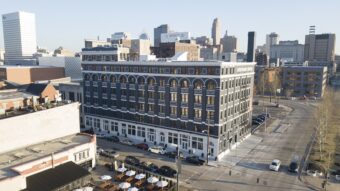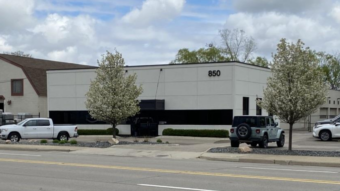The commercial real estate business has been on a hot streak for nearly a decade now. This streak has fueled the business of developers and brokers while reshaping the downtowns and suburban areas of cities across the Midwest. But it’s also kept commercial financing pros extremely busy.
Commercial lenders say that the requests for financing, for everything from major distribution centers to luxury high-rise apartment towers to neighborhood shopping centers, keep flowing into their offices. And today, these requests usually come with good fundamentals, proving that developers and investors have learned from their past mistakes.
The best news of all? The companies providing the financing that keeps the CRE business humming say they expect to remain just as active in 2019.
“How long will we remain this busy? That’s hard to predict,” said Greg Warsek, senior vice president and senior regional manager in the Commercial Real Estate Division in the Chicago office of Associated Bank. “People keep wanting to predict that this is the peak of the cycle, that we are going to run out of steam. But there are a lot of indicators that remain awfully strong and contradict that line of thinking. We keep seeing good deals with sponsors and pre-leasing. That, to me, is a sign that there is still time left in this cycle.”
Warsek’s isn’t the only optimist in the commercial financing space today. Yes, this busy cycle has gone on for a long time. But there simply isn’t much evidence yet that a slowdown in financing requests is looming.
And that’s good news for the entire CRE business.
Of course, commercial real estate does operate in cycles. This positive run has been an awfully long cycle. It stands to reason, then, that a slowdown will arrive eventually.
This doesn’t mean that the industry will crash, just that the constant activity of the last several years will have to diminish somewhat.
When this slowdown does occur, though? That’s not easy to predict.
“There are always going to be those who feel that the end is near,” Warsek said. “I see a lot of predictions that the next downturn will arrive in 2020. That’s easy to predict. But no one has any real support for that. Everyone has different opinions. But I am still seeing very strong deals coming to us. We are seeing very reasonable asks. The level of pre-leasing in the deals we are seeing is high. The deals are appropriately structured. That’s a good sign.”
Associated Bank itself remains extremely busy today, Warsek said. It’s not unusual for commercial financing requests to pick up from the day after Labor Day through the Thanksgiving weekend, with everyone wanting their deals to close before the end of the year.
This year, though, is especially busy, Warsek said. Associated Bank is now building a strong pipeline of deals for the beginning of 2019, deals that will close in the first quarter of the year.
“The activity has picked up in intensity this fall,” Warsek said. “We were steady in September and October. But activity become especially hot in November. We are seeing more deals than usual right now.”
What’s behind the recent hot streak? Warsek said that some sellers might have become more motivated to close deals. They might be reacting to the greater uncertainty in the stock market or rising interest rates.
“They might think that this is the peak right now,” Warsek said. “They might think they have to pull the trigger and sell right now.”
When it comes to financing requests, lenders are seeing deals in all the commercial sectors. But, in little surprise, industrial today is especially busy.
Warsek pointed to ecommerce as the fuel behind the soaring industrial market. He said that a majority of the biggest industrial leases signed in the Chicago area today involve Amazon.
Companies need to open distribution centers near their customers, allowing them to ship their products to them quickly. This benefits the Midwest, with its central location.
“Companies are looking at ecommerce and distribution as part of their business plans,” Warsek said. “But what’s interesting about the industrial market is the mix that we are seeing. It’s not just one type of product. We do see deals for the big boxes and the big fulfillment centers. But we also see deals for smaller buildings that are being built for last-mile distribution. Our industrial requests, then, are really covering a broad product type.”
Spec development is also common in the industrial market today, Warsek said.
“A lot of our clients build on spec based on what they are hearing from brokers,” Warsek said. “They are targeting areas where brokers are telling them there is space available. Industrial construction can be done quickly. It’s less risky than some of the other deals we finance because it can be delivered so quickly. And today, as quickly as they are putting these buildings up, they are leasing them.”



